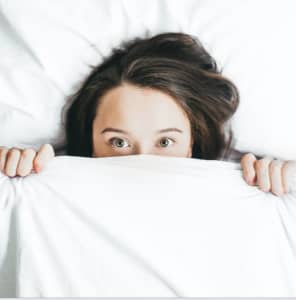[grwebform url=”https://app.getresponse.com/view_webform_v2.js?u=wfNAY&webforms_id=57753701″ css=”on” center=”off” center_margin=”200″/]
How Long Does Insomnia Last?
How long does insomnia last is a question that insomniacs hold dear. Insomnia is a condition that causes people to have difficulty falling asleep or staying asleep. It can be caused by stress, anxiety, medications, or underlying medical conditions. There are several different types of insomnia, which can all last for different amounts of time.
Acute Insomnia
First of all, there is acute insomnia, which is a short-term condition that can last for a single day, a few days, or a few weeks. It is often caused by stressors such as job loss, exams, or a death in the family. Once these issues resolve themselves, the person with acute insomnia can expect to return to normal sleep patterns.
One of the toughest things about this type of insomnia is that you have enough to worry about during the day, and you need your shut-eye more than ever, to be able to cope. It is, therefore, important to find strategies to deal with the stressors to enable you to get the sleep you need.
Get Up and Do Something
The default way to deal with this short-term insomnia is not to lie in bed fretting. Get up and do something practical, such as writing a list. For example, you might note all the things you need to do in order to keep yourself afloat financially, emotionally, or both. This gets it out of your head and onto paper, so that you can forget about it and go to sleep. The next day, make sure you take action on what you have written.
Reach out to friends and family, who can give you some emotional support. And whatever else you do, remember to stay positive. Dwelling on the negative will only make your insomnia worse. However, I do realize that it is easier said than done, when you are alone with your thoughts at night.
No Digitals
Do not be tempted to look at your mobile phone and start checking your emails. The blue light will disturb your sleep even more. If it is general anxiety that is keeping you awake, try mindful meditation or having a relaxing bath before bedtime. It will take some time and effort on your part, but hopefully you’ll be sleeping like a baby again in no time.
Chronic Insomnia
Chronic sleeplessness can last for months or even years, specifically more than three weeks. Between ten and thirty-five percent of the population are struggling to live with this long term condition. Chronic insomnia is categorized as either primary or secondary. Primary insomnia occurs for seemingly inexplicable reasons, is referred to as idiopathic by medical professionals, and seems to occur mostly in middle-aged women.
Long term lack of sleep can lead to reduced productivity and absenteeism in the work place, accidents both at home and at work; all of which have negative consequences on quality of life and well-being.
Core Causal Issues
At its core, primary insomnia is thought to be linked to imbalances in the body’s circadian rhythm, or the natural hormonal cycle that regulates sleep and wakefulness. However, exactly what causes these disruptions in sleep cycles remains a mystery.
Despite this lack of understanding, there are many effective treatments available for those suffering from primary insomnia, including everything from meditation and sleep hygiene tips to melatonin supplements and pharmaceutical medications.
Sleep Hygiene
Sleep hygiene includes establishing regular habits in your life. These include trying to relax before bed by reading or taking a warm bath. Create a regular sleep schedule by going to bed and waking up at the same time each day. Try to avoid caffeine, alcohol, spicy and fatty foods, television, and mobile phones before bedtime, as they can interfere with sleep.
If you’re one of those plagued by chronic sleeplessness, don’t despair, help is out there! Just be sure to talk to your doctor about your options and find a treatment that works for you. After all, getting enough shut-eye is essential for maintaining physical health and mental well-being, so it’s definitely worth doing whatever it takes to get the sleep you need.
Secondary Insomnia
Secondary insomnia is a sleep disorder that is caused by another condition. In other words, insomnia is a secondary condition caused by the first. It can be the result of physical or mental health conditions, medications, or other factors. The most common cause of secondary insomnia is stress, which can, unfortunately, lead to more stress. Other causes include obesity, anxiety, depression, chronic pain, cancer, menopause, dementia and Alzheimer’s disease. Secondary insomnia can also be caused by breathing conditions such as sleep apnoea, and asthma.
How to Deal With It
Unfortunately, these conditions can all occur on a long-term basis, which is not good news for the insomniac. Invariably, it is not the actual health issue that directly causes the lack of sleep. It is the fear, worry, stress and anxiety regarding the disease that keeps the person awake. Learning to deal with these emotions is a great first step to getting a good night’s sleep. To this end, many doctors recommend cognitive behavior therapy.
Other treatments for secondary insomnia typically involve treating the underlying condition. In some cases, bedtime medication, such as sleeping pills, may be prescribed. However, this is a last resort that doctors do not like to try until all other options have been exhausted.
Moving Forward
The best way to overcome insomnia is to not be a victim! Take responsibility for organizing yourself and get back to basics, practice good sleep habits, learn coping strategies for worry and anxiety, and be patient. If you have any medical conditions that could be contributing to your insomnia, treat them accordingly. Over time, with the help of these techniques, your sleep should improve.
Click here to access our section of articles dedicated to treating Insomnia.
Click here to access an in-depth article on primary insomnia from the National Library of Medicine.
=

